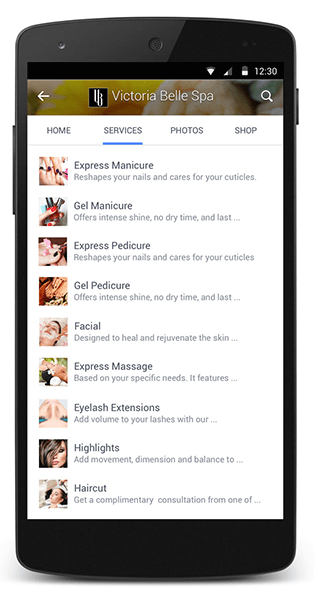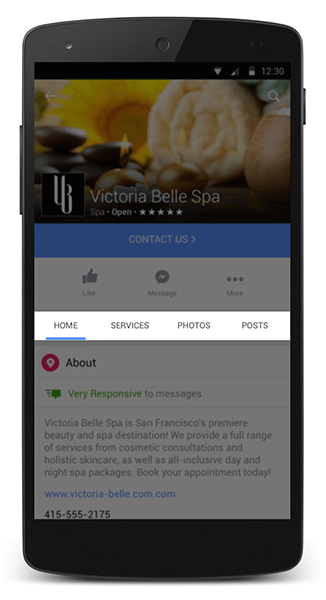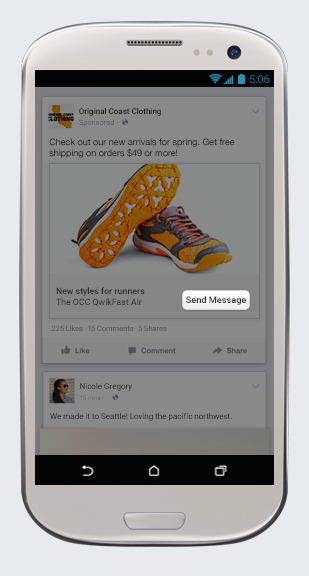Likes ≠ Dollars. Facebook wants Pages to actually earn money for the 45 million small businesses that use them. So today Facebook is upgrading Pages
with a tabbed mobile layout that lets them display storefront
“Sections” where users can “Shop” for products or view a list of
“Services” the business offers. The company is also making calls to
action on business Pages, such as “Call Now,” “Send Message” and
“Contact Us,” bigger, more colorful and more prominent beneath the cover
image.
 The “Shop” section will include Buy buttons powered by Facebook’s partnership with Shopify
so users can check out without leaving the social network. Facebook is
also testing Buy buttons that link out to a business’ traditional
website.
The “Shop” section will include Buy buttons powered by Facebook’s partnership with Shopify
so users can check out without leaving the social network. Facebook is
also testing Buy buttons that link out to a business’ traditional
website.
These changes are the biggest made to Pages since 2012. They build on Facebook’s recent announcement of new messaging capabilities for businesses and badges for companies that respond quickly. Today’s updates could make Facebook Pages a utility, not just a presence for businesses.
COO Sheryl Sandberg opened the press event for the updates at Facebook’s second Menlo Park office by saying “There’s nothing small about small businesses.” But she explained that building a mobile commerce experience is tough and expensive, especially for small businesses. That’s why Sandberg talked about SMBs using Facebook to do mobile business easily, for free.
Instead of building an entire mobile website or app, Facebook wants companies to instead rely on their Facebook Pages. That’s why it’s starting to build out Sections specific to different types of businesses.
 Andrew
Chau, the co-founder of the Boba Guys cafe, tells me he started the
business’ online presence with a Facebook Page not a website because
that’s where it could get “the most eyeballs”. He says he tells people
to ‘Check us out on Facebook’ rather than
‘Download our app’ because “they aren’t going to do that”. People don’t
necessarily want a whole app just for their local tea shop.
The strategy is similar to WeChat’s platform for businesses in China.
Rather than having to build an app, get people to download it, and then
get them to use it, WeChat lets businesses create “official accounts”
that users can easily follow and buy from.
Andrew
Chau, the co-founder of the Boba Guys cafe, tells me he started the
business’ online presence with a Facebook Page not a website because
that’s where it could get “the most eyeballs”. He says he tells people
to ‘Check us out on Facebook’ rather than
‘Download our app’ because “they aren’t going to do that”. People don’t
necessarily want a whole app just for their local tea shop.
The strategy is similar to WeChat’s platform for businesses in China.
Rather than having to build an app, get people to download it, and then
get them to use it, WeChat lets businesses create “official accounts”
that users can easily follow and buy from.
The first step in this direction is the new sections, Shop and Services. Normally, businesses would have to constantly post about their products or services to make them immediately visible on their Pages. Now they’ll have a prominent, dedicated section where they can sell their products and services.
These sections will get their own tabs rather than burying them down
the Page, which makes them easier to find especially on mobile. On the
home page/landing page/main tab, Facebook will show a set of highlights
from a business’ other tabs. This kind of cross-platform optimization
would be tough for a business to do on its own, but Facebook makes it
happen automatically.
 And
if a business’s services require negotiation or deep customization,
that can use a “Message To Buy” button that triggers an instant message
conversation between the customer and business so they can hash out the
details.
And
if a business’s services require negotiation or deep customization,
that can use a “Message To Buy” button that triggers an instant message
conversation between the customer and business so they can hash out the
details.
Previously, Facebook announced that users would be able to message Pages for support, and those that responded in under five minutes 90 percent of the time would get a “Very Responsive” badge of honor on their Page. While this might seem like extremely tough metrics to meet, Facebook says 500,000 Pages quickly were able to earn the badge.
To assist with this social customer service, Pages can compose Saved Replies that they can quickly personalize with a customer’s name or situation before sending them. Page admins can also respond to Wall Posts or comments with messages. This helps companies keep customer support in private, rather than becoming a public spectacle on their Page’s wall that could hurt their brand.
If Facebook succeeds here, it will see small and medium-sized businesses directing mobile traffic to their Pages, rather than their websites. This not only makes Facebook more useful for users, but it will act as a gateway to getting businesses to pay for ads promoting those Pages.
When I asked Facebook’s Product Marketing Director for Pages Benji Shomair about this strategy, he told me “Pages are free. The more businesses we have on the platform and the more value they’re able to generate from their Facebook Pages…there could be benefits to our business more broadly.” When I asked again if that meant these tools could boost ad sales, he admitted “Potentially, yeah. I agree.”
The average boutique owner or plumber shouldn’t have to learn how to build an app. Now they don’t.
 The “Shop” section will include Buy buttons powered by Facebook’s partnership with Shopify
so users can check out without leaving the social network. Facebook is
also testing Buy buttons that link out to a business’ traditional
website.
The “Shop” section will include Buy buttons powered by Facebook’s partnership with Shopify
so users can check out without leaving the social network. Facebook is
also testing Buy buttons that link out to a business’ traditional
website.These changes are the biggest made to Pages since 2012. They build on Facebook’s recent announcement of new messaging capabilities for businesses and badges for companies that respond quickly. Today’s updates could make Facebook Pages a utility, not just a presence for businesses.
COO Sheryl Sandberg opened the press event for the updates at Facebook’s second Menlo Park office by saying “There’s nothing small about small businesses.” But she explained that building a mobile commerce experience is tough and expensive, especially for small businesses. That’s why Sandberg talked about SMBs using Facebook to do mobile business easily, for free.
Instead of building an entire mobile website or app, Facebook wants companies to instead rely on their Facebook Pages. That’s why it’s starting to build out Sections specific to different types of businesses.
 Andrew
Chau, the co-founder of the Boba Guys cafe, tells me he started the
business’ online presence with a Facebook Page not a website because
that’s where it could get “the most eyeballs”. He says he tells people
to ‘Check us out on Facebook’ rather than
‘Download our app’ because “they aren’t going to do that”. People don’t
necessarily want a whole app just for their local tea shop.
Andrew
Chau, the co-founder of the Boba Guys cafe, tells me he started the
business’ online presence with a Facebook Page not a website because
that’s where it could get “the most eyeballs”. He says he tells people
to ‘Check us out on Facebook’ rather than
‘Download our app’ because “they aren’t going to do that”. People don’t
necessarily want a whole app just for their local tea shop.The first step in this direction is the new sections, Shop and Services. Normally, businesses would have to constantly post about their products or services to make them immediately visible on their Pages. Now they’ll have a prominent, dedicated section where they can sell their products and services.
 And
if a business’s services require negotiation or deep customization,
that can use a “Message To Buy” button that triggers an instant message
conversation between the customer and business so they can hash out the
details.
And
if a business’s services require negotiation or deep customization,
that can use a “Message To Buy” button that triggers an instant message
conversation between the customer and business so they can hash out the
details.Previously, Facebook announced that users would be able to message Pages for support, and those that responded in under five minutes 90 percent of the time would get a “Very Responsive” badge of honor on their Page. While this might seem like extremely tough metrics to meet, Facebook says 500,000 Pages quickly were able to earn the badge.
To assist with this social customer service, Pages can compose Saved Replies that they can quickly personalize with a customer’s name or situation before sending them. Page admins can also respond to Wall Posts or comments with messages. This helps companies keep customer support in private, rather than becoming a public spectacle on their Page’s wall that could hurt their brand.
If Facebook succeeds here, it will see small and medium-sized businesses directing mobile traffic to their Pages, rather than their websites. This not only makes Facebook more useful for users, but it will act as a gateway to getting businesses to pay for ads promoting those Pages.
When I asked Facebook’s Product Marketing Director for Pages Benji Shomair about this strategy, he told me “Pages are free. The more businesses we have on the platform and the more value they’re able to generate from their Facebook Pages…there could be benefits to our business more broadly.” When I asked again if that meant these tools could boost ad sales, he admitted “Potentially, yeah. I agree.”
The average boutique owner or plumber shouldn’t have to learn how to build an app. Now they don’t.

Post A Comment:
0 comments so far,add yours